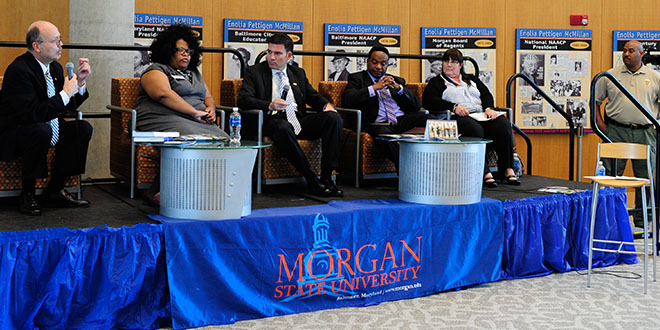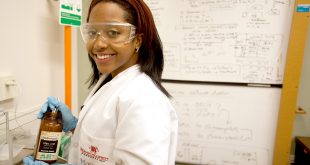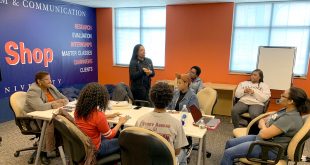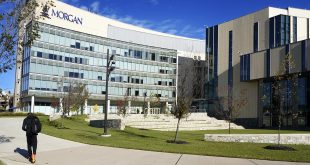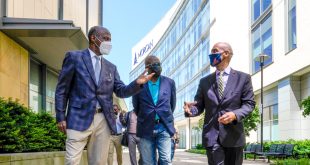Morgan State University hosted a lively panel discussion on Terrorism, Gang Awareness and Prevention on its campus at the Earl S. Richardson Library on Aug. 17, 2017. Organized by Morgan’s Division of Research and Economic Development (D-RED) with support from the U.S. Department of Homeland Security (DHS) and Delmock Technologies, Inc., the panel had a goal of increasing the understanding of the interactions and other commonalities of street gangs and terror organizations, from the perspectives of national and international experts in law enforcement, intelligence, criminal investigation, social work, public health and epidemiological criminology (“epicrim”). For example, terror group “cells” and street gangs share many of the same characteristics and methods to support their illicit enterprises: selling of drugs; trafficking of humans; trafficking of guns and other weapons; prostitution and violence.

Timothy Akers, Ph.D., assistant vice president for Research Innovation and Advocacy and professor of Public Health at Morgan, organized the event and opened the discussion by showing how the factors underlying criminal behavior, whether gang- or terrorism-related, are likely to be closely related to the factors that produce poor health outcomes. He also illustrated how the epicrim framework allows for greater clarity by linking knowledge about the causes and epidemiology of antisocial and violent behavior derived from criminology with the emphasis on prevention theory found in public health.
Tina Billington-Hughes, lecturer at De Montfort University, Leicester, U.K., and a former police detective, spoke about her experiences with transnational organized crime and the multiagency partnerships being implemented in the U.K. to address the problems of homegrown terrorists and cyberterrorism. Harold Strickland, retired intelligence officer and special agent in the U.S. Department of Defense, discussed the importance of interdiction in minimizing the effectiveness of organized criminal enterprises. Strickland showed how military intelligence was used to prevent the smuggling of more than 44,000 H1N1- (Bird Flu-) infected chickens into the U.S.
The local community was also well represented. Stacy Smith, managing partner of the Urban Business Center and well-known advocate for the people of Baltimore City, discussed the various strategies, including the epicrim approach, used to impede youth from joining gangs. Special Agent Michael Fregeau of the Baltimore Office of the FBI discussed his experiences investigating Al Qaeda and homegrown terrorists. Moderators for the panel were Lance Hatcher, chief of police at Morgan, who has more than 33 years of law enforcement and investigative experience, and Bill Hervey, professor at Middle Georgia State University and internationally regarded expert in public health law.
 The panel continues the exploratory research being done at Morgan State University relating to crime and health in Baltimore communities and beyond. For example, Dr. Akers’ work in the development of his theory of epidemiological criminology has led to the writing of a number of books, articles and dissertations as well as teaching of the subject in both undergraduate and graduate schools at major U.S. and international universities. Last November, Dr. Akers was invited to speak about global and domestic terrorism on the 10th anniversary of the prestigious Society for Terrorism Research, hosted at the Universiteit Leiden, in The Hague, Netherlands. The title of his invited talk was “Epidemiological Criminology: A Theoretical Framework for Domestic and Global Terrorism Research and Analysis.” Through the work of Dr. Akers and his colleagues, new, emerging theories are being introduced to a world where once unthinkable violence is now reality. Morgan State University is embracing this work by establishing the Center for Gun Analysis and Neighborhood Gang Studies (C-GANGS), to serve as a bridge connecting law enforcement, public health and counseling.
The panel continues the exploratory research being done at Morgan State University relating to crime and health in Baltimore communities and beyond. For example, Dr. Akers’ work in the development of his theory of epidemiological criminology has led to the writing of a number of books, articles and dissertations as well as teaching of the subject in both undergraduate and graduate schools at major U.S. and international universities. Last November, Dr. Akers was invited to speak about global and domestic terrorism on the 10th anniversary of the prestigious Society for Terrorism Research, hosted at the Universiteit Leiden, in The Hague, Netherlands. The title of his invited talk was “Epidemiological Criminology: A Theoretical Framework for Domestic and Global Terrorism Research and Analysis.” Through the work of Dr. Akers and his colleagues, new, emerging theories are being introduced to a world where once unthinkable violence is now reality. Morgan State University is embracing this work by establishing the Center for Gun Analysis and Neighborhood Gang Studies (C-GANGS), to serve as a bridge connecting law enforcement, public health and counseling.
“This transdisciplinary approach, including public health and social work in what has been traditionally a solely law enforcement purview, provides a transformational research platform and toolkit for making our communities safe and resilient,” said Victor McCrary, Ph.D., vice president for Research and Economic Development at Morgan.
 Morgan State University Newsroom Morgan State University
Morgan State University Newsroom Morgan State University
